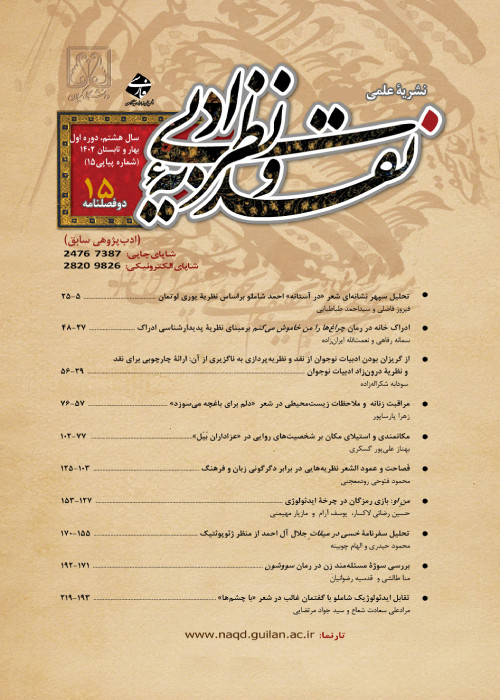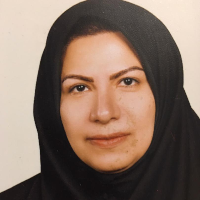The Problematic Subject of Women in Simin Daneshvar’s Savushun
In her Savushun (1969), Simin Daneshvar gives an account of the life and family of an educated Khan in a war that broke out in the early 1940s between the nomads and the central government. She weaves her narrative with the presence of English people and their interference with the relationship between the nomads and the government which problematises the acceptance of the manifestations of modernity. Yousef, who desires the settlement of the nomads and reprimands the renegade Khans, is against foreign intervention. Eventually, he is murdered for not selling his grain to the English. After his death, his wife, Zari, who has internalised Yousef’s problem with the English, becomes a petitioner and a rebel. Her protest is against the English interference and the passivity of the government. In this regard, the significance of national ideals in Savushun contributes to the definition and status of the feminine subject. It is worth mentioning that the novel is the first work of fiction written by an Iranian writer. The problematisation of the female character is usually intertwined with nationalism, settlement, and colonialism. The dichotomy of modernity and nationalism and conflicting views on foreign interference, according to the present article, are among the major concerns in the problematisation of women.
Written by Simin Daneshvar in 1969, Savushun is the first novel in women’s fiction in Iran. It gives an account of the life and family of an educated Khan in a war that broke out in the early 1940s between the nomads and the central government. Yousef, the educated Khan who kindly tends to his subjects, is the protagonist of the novel. His refusal to sell his grain to the English leads to his murder which initiates the transformation of the female character, Zari, who seeks justice for her husband’s death.
The article at hand is a descriptive-analytical study that employs library sources to analyse the female protagonist in light of György Lukács’ problematic character theory.
The novel, for Lukács, is the outcome of the separation of the object from the mind, which shapes the narrative structure in accordance with the internalised experience of time. The epic represents the mind-object unification, but the novel, which is rooted in the epic, marks their differences and unveils the solidarity of the mind (Pouyandeh, 1390 [2011]: 192). In his later works, Lukács investigates the novel in light of the economic transition of the West from feudalism to the bourgeoisie. A realist novelist, for Lukács, is aware of the contradictions caused by the change in the economic structure and has the ability to represent them in his/her novel. Honoré de Balzac's La Comédie Humaine, Lukács argues, is a perfect example of a realist work. For Balzac, the greatest intellectual achievements of the bourgeoisie revolution, which are the imposition of the thoughts of the bourgeois society on humanities and the arts, are abstract ideals in contrast with the real capitalist economy (1380 [2001]: 64). The problematic protagonist seeks the qualitative and ethical values in the world which reflects the dominant exchange value. Similarly, Goldman investigates the protagonist through different stages of capitalism. In this regard, the problematic protagonist belongs to the first stage of capitalism, which glorifies liberal and individualistic values. The conflicts between qualitative and moral values and commodity values in the capitalist world affect the personality of the problematic hero. Canonical novels echo the social, political, and economic structures of their time, and their concrete and existential qualities represent the conflict between different societal forms in light of the change in the economic structure (Pouyandeh, 1381 [2002]: 127). Along the same lines, the political and economic transition of Iran’s constitutional revolution marks the emergence of the novel (Iranian, 1358 [1979]: 77). The formation of the nation-state by Reza Shah marks the transition from the prototypes of the novel to its final form (Sepehran, 1399 [2020]: 19). The new identity and re-defined roles of women gave them the chance to express themselves through novels.
This study investigates the interconnectedness of modernity, sexuality, and the life of the protagonist in Savushun. Modernity aims to change the status of women as reflected in Reza Shah’s emphasis on nationalist tendencies (Papeli Yazdi, 1397 [2018]: 117). In this regard, every citizen had to obey the state, which in turn affected the nomads. The resettlement of the nomads was among Reza Shah’s main objectives, which after the September of 1941, led to an uprising against the state. The English provoked the nomads and, at the same time, cooperated with the state, showing an ambivalent attitude toward modernity (Abrahamian, 1383 [2004]: 176). Defending the resettlement of nomads, the protagonist, Yousef, condemns the interference of the English and eventually gets killed by them. Although Zari studied in an English institution and learned tailoring from Zinger, she begins to resent the English. According to Yousef, as an aftermath of the English interference with modernization, they own the best schools, hospitals, and tailoring houses and markets (Daneshvar, 1399 [2021]: 127). Zari and Yousef encounter useless middlemen who make a living by serving the English. Yousef’s death transforms Zari’s understanding of the socio-political structure and encourages her to shift internal monologue with dialogue. Through her speech at Yousef’s funeral, Zari turns the funeral into a political demonstration which in turn leads to her problematisation.
Savushun exposes the socio-political structure that came to prominence after the September of 1941 and reflects the complexities of nationalism and modernity in light of foreign interference. On the other hand, the same complexity forms the identity of the protagonists. English interference problematises Yousef’s identity, which in turn problematises Zari’s identity, as far as activism and nationalism are concerned.
- حق عضویت دریافتی صرف حمایت از نشریات عضو و نگهداری، تکمیل و توسعه مگیران میشود.
- پرداخت حق اشتراک و دانلود مقالات اجازه بازنشر آن در سایر رسانههای چاپی و دیجیتال را به کاربر نمیدهد.




